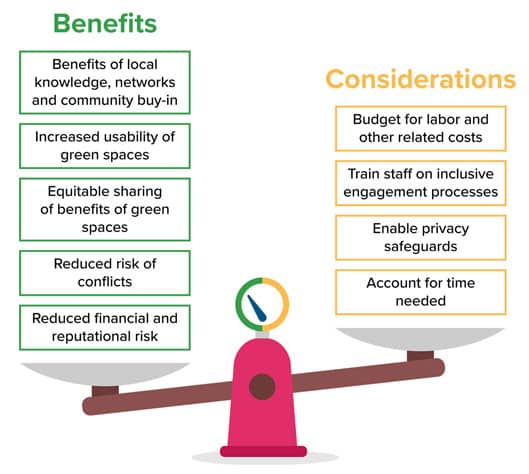Apart from improving socioeconomic outcomes, adopting a social equity approach may also lead to more efficient and sustainable project outcomes. (United Nations Framework Convention on CLimate Change, 2016; UN-REDD Programme, 2011; Wilson, 2009)
When forest-related services are designed considering everyone’s needs, they can benefit from improved usability, especially services that rely on user fees or public participation for maintenance. (UN-REDD Programme, 2011) Solutions that integrate the voices and recognize the rights of marginalized groups like women and indigenous people can also benefit from their local knowledge and social networks. (Blackman and Velt, 2018; Leisher et al, 2016) Incorporation and acknowledgement of local and traditional “know-how” can further lead to better decisions for forest governance and conservation. (Rights and Resources Initiative, 2018)
Meaningful engagement with local communities, while recognizing their rights according to the local context, can create stronger community buy-in and better harmonization of interests and plans, reducing the risk of conflicts and reputational and financial losses in the future. (Herz, Vina, and Sohn, 2007) Cities can conduct cost-benefit analyses and proper budgeting to evaluate the resources required to engage in inclusive and equitable processes. For instance, engaging hard-to-reach groups can be lengthy and resource-intensive, and might involve costs for per diems and travel allowances, translation services, provision of child-care for participating women, and capacity building for stakeholders and staff. Officials should put in place adequate privacy and safety measures for stakeholders, and free, prior and informed consent should be secured during data collection processes.*

*See the section on Meaningful Stakeholder Engagement for more information.